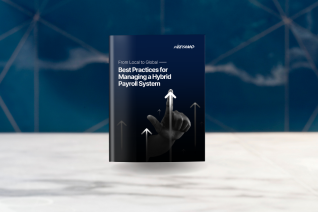Run your business seamlessly with Neeyamo as we help you go beyond borders to manage your international payroll and hire new talent in Equatorial Guinea.
Overview
Equatorial Guinea is a small country located in West Africa, consisting of a mainland region known as Rio Muni and several offshore islands, including Bioko, where the capital city of Malabo is situated.
The economy of Equatorial Guinea depends heavily on its natural resources, particularly its oil and gas reserves.
Neeyamo provides assistance for onboarding and management of employees in Equatorial Guinea along with the processing of a firm's payroll, compliance, benefits and more.
Tools And Instances
Facts And Stats
Capital
Malabo
Currency
Central African CFA franc (XAF)
Official Language
Spanish, French & Portuguese
Fiscal Year
1 January - 31 December
Date Format
DD/MM/YYYY
Country Calling Code
+240
Other Languages
Fang, Bubi, and Igbo
Time Zone
GMT (UTC+01:00)
Global Payroll
Overview
Handling payroll for a widespread workforce can pose as a major challenge for any firm. The added complication of compliance can make things worse and drastically effect the time and efforts that can be used in other equally important aspects of an organization's development.
Over the years, Neeyamo has observed these complexities and strived to provide a global payroll solution through a single technology platform, Neeyamo Payroll.
Payroll Taxes
Payroll tax is the percentage amount retained from an employee's salary and paid to the government to invest in the welfare of the general population.
Employee Taxes
Employee Contributions:
- National Institute of Social Security: 4.5%.
- Work Protection Fund (WPF): 0.5%.
Employer Taxes
Employer's Contributions:
- National Institute of Social Security (INSESO, for its Spanish acronym) is 21.5%.
- Work Protection Fund (WPF) is 1%.
Payroll Cycle
Overview
Undoubtedly, payroll is a critical aspect of any organization. The pay cycle is a notable feature that provides a sense of accountability for an employee to be paid consistently for their work.
Frequency
The frequency cycle in Equatorial Guinea is Monthly.
13th Month Cycle
In Equatorial Guinea, unlike some other countries, there is no standardized practice or legal requirement for employers to provide additional month's salary as bonuses or benefits to their employees.
Global Work
Overview
An Employer of Record service provider helps you get rid of the hassle of handling the complexities that come with setting up a new employee in remote locations. They act as legal employers, facilitate salary payments, and handle everything from health insurance, payroll taxes, and employee benefits to comply with local tax laws and regulations.
This ensures that the client company can focus on the employee’s everyday tasks safely in the knowledge that they have a cost-effective solution as they continue their global expansion.
HR Mandates and Practices
Minimum Wage
The minimum wage in Equatorial Guinea is 129,035 XAF.
Overtime
According to the Labor Code of the Republic of Guinea, the extra hours of work beyond the regular 40 hours a week are considered overtime. The working hours, including overtime, are limited to 10 hours a day and 48 hours a week.
Overtime hours are compensated at a rate of 25% above the regular hourly wage for daytime work and 50% above the regular hourly wage for nighttime work or when extending into the night period.
Data Retention Policy
Equatorial Guinea does not have a comprehensive data protection law similar to the GDPR in Europe.
Without specific data retention laws, organizations typically follow general principles of necessity and proportionality. This means retaining data only as long as necessary for its intended purpose.
Hiring and Onboarding Requirements
Hiring
In Equatorial Guinea, hiring preferences and requirements can vary depending on the specific industry, position, and employer. The government of Equatorial Guinea may encourage or require employers to give preference to qualified local citizens or residents when filling job vacancies. This is often referred to as "localization" or "national treatment." The specific regulations may vary depending on the industry and the nature of the position being filled.
Equatorial Guinean law prohibits discrimination in hiring based on factors such as race, color, sex, religion, political opinion, or social origin. Employers are required to ensure that their hiring processes are fair and equitable, providing equal opportunities to all qualified candidates.
Onboarding
When onboarding employees in Equatorial Guinea, employers must ensure compliance with the following requirements:
- Employment Contract: Provide a written employment contract detailing job duties, compensation, and other terms of employment.
- Social Security Registration: Register the employee with the National Institute of Social Security (INSESO). The employer's contribution rate to INSESO is 21.5%.
- Work Permit and Visa (for foreign employees): Obtain necessary work permits and visas for foreign employees before they begin work.
- Health and Safety Compliance: Ensure that the workplace meets local health and safety regulations. Provide necessary training and protective equipment.
- Tax Registration: Register the employee for tax purposes and ensure proper tax withholding.
- Orientation and Training: Conduct an orientation session to familiarize new hires with company policies, procedures, and culture. Provide job-specific training as needed.
- Employee Handbook: Provide an employee handbook outlining company policies, benefits, and code of conduct.
- Medical Examination: Arrange for a pre-employment medical examination to ensure the employee is fit for the job.
Probation
According to Article 31 of the Labor Code, the maximum length of a probation period is typically three months for unskilled workers and six months for skilled workers.
Leave
Public Holidays
The dates below may be modified if there are any changes in the gazette.
- January 1 - New Year's Day
- March 29 - Good Friday
- May 1 - President's Day
- May 30 - Corpus Christi
- August 3 - Freedom Day
- August 15 - Constitution Day
- October 12 - Independence Day
- December 9 - Feast of the Immaculate Conception
- December 25 - Christmas Day
Annual Leave
Employees are entitled to one month of paid annual leave for each year of continuous service. After ten years of service, the leave entitlement increases by one additional day for each subsequent year worked. This system rewards long-term service with additional leave days.
Sick Leave
Employees are eligible for paid sick leave after completing three months of service. The duration of sick leave can vary based on the length of employment and the severity of the illness. A medical certificate is typically required to validate the sick leave. Compensation is generally covered by the employer or may be provided through social security benefits.
Maternity Leave
Women are entitled to maternity leave starting six weeks before the expected birth date. To receive maternity leave benefits, they need to inform their employer and provide medical certificates confirming their pregnancy. The benefits cover six weeks before and six weeks after the birth, provided the employee is covered by social security.
Termination
Notice Period
Notice Period based on service and common practices:
1 Week Notice:- Applicable to employees who have been with the company for at least one month but less than six months.
- Either the employer or the employee must provide one week's written notice before termination.
- Applicable to employees who have completed six months or more of service.
- Either the employer or the employee must provide one month's written notice before termination.
Severance Pay
For redundancies, the employee will receive 45 days’ pay for each year of service.
Visa
Overview
Any person who enters Equatorial Guinea to work or do business as an employed or self-employed worker, regardless of the duration of his stay, shall obtain a work permit.
US nationals are exempt from work permit requirements for a maximum of 90 days per year. After this period, their situation should be regularised, and a work permit should be obtained.
The application process for a work permit in Equatorial Guinea:
- Submission: Applicants must submit a formal letter addressed to the General Director of Labour, including an application form and any required documents.
- Review: Once received, the application must be reviewed by the General Directorate of Labour within seven days for a decision by the General Director.
- Documents for Employed Workers: The client must provide documents proving their business activity and specify the services the foreign worker will provide.
- Qualifications: If the job position requires specific qualifications, the foreign worker must provide proof of these qualifications.
Other documents required for a work visa in Equatorial Guinea:
- A copy of the applicant’s passport;
- A copy of the applicant’s police clearance report;
- A copy of the applicant’s updated curriculum vitae;
- A sworn oath and application letter from the applicant’s employer/EG national inviting the foreigner to Equatorial Guinea;
- Submit an application letter to the MMH (if being permanently transferred into Equatorial Guinea);
- Obtain a favourable resolution from the MMH (if the person is being permanently transferred to Equatorial Guinea);
- Proof of payment of the applicable fees at the Public Treasury’s account; and
- Apply for the letter of invitation and submit the aforementioned documents to the MNS.
Following are the work permit visas:
- B1: Initial Work Permit which allows workers to work for the client for a period of 1 year.
- BR: Renewal of the B1 Work Permit – valid for 2 years.
- C: Renewal of the BR Work Permit – valid for 3 years.
- A: Temporary Work Permit for temporary employees – valid for 6 months (renewable).
- I: Informal Work Permit for workers of the informal sector that provide services as employed or self-employed that are not allowed to contract workers – valid for 1-year (renewable).
- PCP: Work Permit for Self-employed Workers for foreigners conducting business that are allowed to contract workers – valid for up to 3 years.
- PTA: Agriculture Work Permit for employed or self-employed workers that work in the agricultural sector – valid for 3 years (renewable).
- PP: Permanent Work Permit – granted to foreigners meeting certain conditions rooted in the country.
Employee Background Checks
Legal and Background Checks
In Equatorial Guinea, background checks on employees are not standardized, and the specific processes can vary depending on the industry and the requirements of the employer.
Some general practices and considerations often followed are:- Identity and Work Authorization
- Criminal Record Check
- Education and Qualification Verification
- Medical Examination
- Specialized Checks
Last updated on August 8, 2024.
If you have any queries or suggestions, reach out to us at irene.jones@neeyamo.com
Have Queries? Get In Touch With Us
Get in touch with one of our experts and take a quick demo of our services







